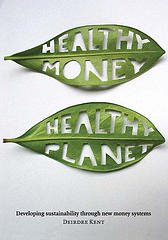This is a New Zealand website for those interested in organics. It has published the following review.
Money, Healthy Planet
Developing Sustainability Through New Money Systems
Deirdre Kent
In her preface to Healthy Money Healthy Planet, author New Zealander Deirdre Kent says the book is her contribution to the conversation on how to preserve the planet and resolve economic injustices.
She calls the way money currently operates “sick money” and here’s why:
Income Disparity In New Zealand, since the 1980s, the highest income families have increased their share of income - the top 10 per cent has gained, the next 20 per cent is holding their own.
Meanwhile, the bottom 70 per cent are worse off than 10 years ago.
In 1960, the wealthiest 20 per cent of the world’s population, living in the richest countries, had 30 times the income of the poorest 20 per cent. By 1977, the figure had increased to 74 times.
The assets of the world’s 358 billionaires exceed the combined annual incomes of countries accounting for 2.3 billion people or nearly half the world’s people.
Debt US$40 billion a year flows from developing countries to the developed countries and the developing world now spends US$13 on debt repayment for every US$1 it receives in grants.
As a result of the debt crisis, 7 million children die each year.
Money Creation Healthy Money, Healthy Planet describes how money currently works and shows how increasing financial inequality is built into the system.
She maintains that many of the environmental and social problems result from the creation of money out of thin air by private banks as interest bearing debt. She describes how it works and explains why some central bankers, economists and politicians deny that this is how money works.
Kent is in favour of loans being made, but says the payment of interest on top of the loan creates a situation where there is never enough money in circulation to cover the interest, in practice meaning there must be winners and losers in the current economic system.
In a section on the invisible governments, she lists “secretive” organizations that are dominated by big business interests and that seek to influence governments - powerful and unaccountable groups which make democracy impotent.
Organic Model She explains how healthy money would be the result if the economy was built on an organic model where power is not centralized, and money can also be created at the regional level and used to revitalize regional economies.
She envisages economies nested in economies using a pattern which mimics nature, and which will help keep money circulating at the local and national level, instead of being a one way flow toward oversized points of power as currently happens.
Monetary literacy for the masses Kent is a New Zealand grandmother with a lifelong involvement in political issues, and an interest in challenging underlying assumptions and beliefs, she has always been interested in mathematics (and was a maths teacher).
She advocates monetary literacy for the ordinary person and says economics permeates our lives and is far too important to be left solely to economists. Her book is a good starting point for newcomers as it is written in layperson’s language.
It is also a useful resource for people already interested in monetary reform as it assesses a number of complementary economic and monetary systems which have been tried in various countries, including New Zealand.
Monetary reform resource She assesses the strengths and weaknesses of various currencies, looking at why some have worked and others failed - thus providing a useful reference for people wanting to set up complementary currencies, for instance, which would work alongside the national currency, but would return power to the grassroots level and encourage regional rejuvenation.
Her book includes a table of currencies with their strengths and weaknesses, and a list of useful websites in categories including Green economics, history and theory of money, monetary reform, GDP, organic model of organization, various currencies and ethical investments.
It also lists useful organizations in New Zealand and Australia and has an extensive bibliography. A glossary is a good aid to people taking their first steps in economic literacy.
Craig Potton Publishing
RRP: $34.95
Available from
H. Dew
Living Economies
12 Costley St
Carterton
Wednesday, February 22, 2006
Subscribe to:
Posts (Atom)

